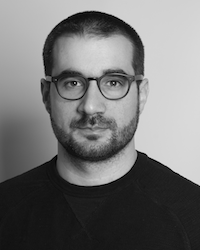iNOVA Media Lab – research, project development and networking with media
Joining the worlds of social sciences and emerging technologies, by applying their research to media industry practices.
Located in Lisbon, Portugal, iNOVA brings a different approach to media innovation. It aims to incorporate new digital technologies within the traditional media industries, as well as research new methods and products to improve the quality of reporting and solve issues within the media environment:
“I think media innovation is not just linked to addressing the challenges of the industry, but also to seeing what’s not already there. It’s about developing new modes of intermediation with content. In a way it’s addressing industry problems, but it’s also about conceiving and developing applied answers for the future,” says Paulo Nuno Vicente, coordinator of the iNOVA Media Lab.
Media research applied to journalism practices
The lab started in February 2016 under the vision and coordination of Paulo Nuno Vicente who looked to create a new venture for media innovation inspired by research labs from other areas.
iNOVA Media Lab focuses its resources on three main areas:
- Conducting applied research in various digital media innovation strategies, such as immersive and interactive storytelling, digital journalism, science communication, digital methods and web platforms, information visualization and the future of education;
- Creating workshops and training courses for both students, researchers, professors and media professionals
- Offering finished products and services per request, including audio and video production using 360 degrees formats, immersive technologies and other digital devices and methods.
PANOPTIS project
iNOVA Media Lab’s primary interest at the moment is the development of the PANOPTIS project, an interdisciplinary project around climate change focused on redefining reporting through immersive technology.
The one-year long project is designed to take a creative and cutting-edge approach to reporting on the human contribution to climate change by developing two prototypes of immersive documentaries in two different areas: Guinea-Bissau and Madeira Island.
According to Paulo Nuno Vicente, who is also the principal investigator for the PANOPTIS project, the objective is not only to raise awareness of the issues surrounding climate change, but also enriching the media’s view on reporting by incorporating digital technologies into traditional journalism.
“In a way, what we want to do is address contemporary issues and develop the potential coming from the language of new media. So on top of doing the traditional documentary using new media, also studying and testing how to use immersive media and data visualisation. You need to challenge the status quo.”
The project brings together a consortium of partners across Portugal, the main ones being the Portuguese Institute for Ocean Studies and NOVA Laboratory for Computer Science and Informatics (NOVA LINCS), and also from the United States, in collaboration with University of Texas at Austin.
Industry partnerships
Although fairly new, iNOVA Media Lab’s work portfolio includes a variety of projects done in collaboration with external media organisations and university students.
Such projects include the “90 Seconds of Science” radio programme, broadcasted daily by Antena 1, one of Portugal’s national public radio stations. The programme is dedicated to presenting new and different research methods and projects done all across Portugal.
Thanks to the success of the radio show, iNOVA Media Lab is currently working on developing a pilot episode for a spin-off called “5 Minutes of Science”, which will be available on TV and online.
iNOVA Media Lab also offers a variety of workshops and training courses surrounding immersive media, entrepreneurial journalism and storytelling using digital media technologies. These are part of their Digital Media Summer Institute, created in partnership with The University of Texas at Austin.
In January, the lab organised a Digital Media Winter Institute, dedicated to advancing the study of new media, social media methods, and data visualisation. The event promoted interdisciplinary research through the data-sprint approach and other intensive hands-on work courses.
Future projects and collaborations
iNOVA Media Lab will enter a new phase in January 2018, which will allow it to develop different exploratory studies and prototypes connected to digital media innovation and applied research. As part of the new phase, the lab expects to grow its team by hiring new staff, bringing the total number of collaborators and employees to 13.
“I do have very clear metrics that help the development of the laboratory itself, and part of that is the ability to attract people, so PhD researchers and master students; committed, engaged and motivated people,” says Paulo Nuno Vicente.
Moreover, the team is looking to start a new, 4-year research project named “Innov-action”, focused on analysing innovative processes and methodologies across the country. The project consists of “mapping” creative and new development methods within cultural industries in Portugal and producing research reports on their methods.
Finally, iNOVA Media Lab is looking to increase its network by liaising with other media labs nationally and internationally, as well as maintaining and developing new relations with media industries.
CONTACT POINT

Paulo Nuno Vicente, coordinator, iNOVA Media Lab
Twitter: @iNOVAmedialab
Web: inovamedialab.org
